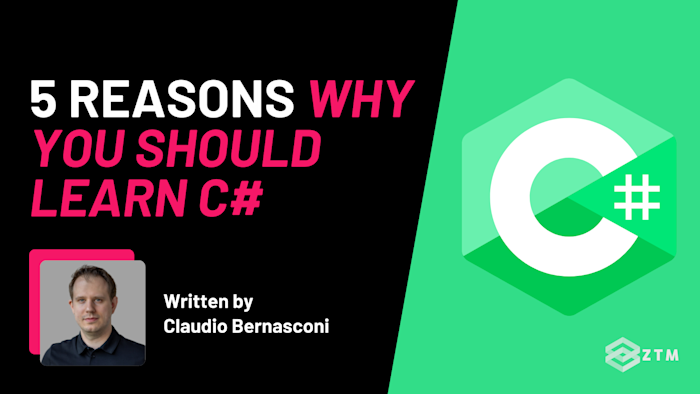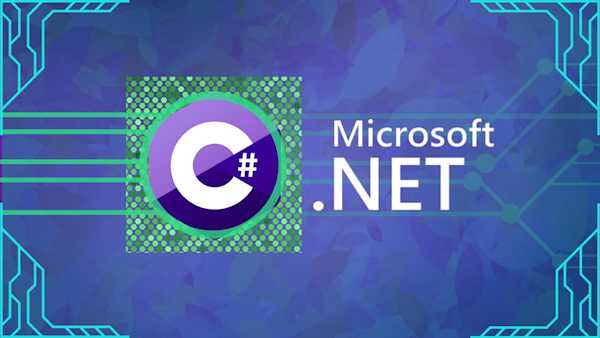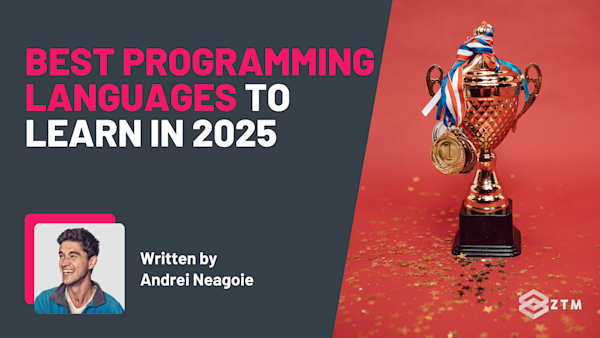Have you ever wondered why C# and .NET development is still so popular, even when JavaScript and Python are trending?
Well, there are a few good reasons.
But rather than give a huge list you won’t read, I’ll break down 5 of my favorite points of why I think that C# is still straight crushing it 23 years down the line, as well as why I think you should learn C# ASAP, to level up your current programming skills.
So let’s get into it!
Don’t feel like reading? Get an overview of each of these reasons in the video below.
Reason 1: Cross-platform capabilities
C# and .NET give us the ability to not only write code using Windows, Linux, and macOS, but it even allows for collaboration of developers between different operating systems.

This means that we can implement applications running on different operating systems, such as Android and iOS.
But it doesn’t end there. We can also build:
- Desktop apps
- Mobile apps
- Web apps
- Cloud-native services
- IoT solutions
- and even games - all using the same programming language and platform!
Sure, you can learn Go or Rust to implement a high-performance backend, but when you want to develop a web application using that service, you'll still need to learn C# or JavaScript to make it all work together.
Case in point?
- Microsoft Azure is one of the most popular platforms for building APIs, aka the things that make different programs work together
- Azure works perfectly with C#, because C# is Microsoft's flagship language
- So building API's with C# is nice and easy
You couldn't ask for a better solution!
Reason 2: C# is a powerful and versatile programming language
C# is an Object-Oriented Programming language (OOP), and it’s statically typed. This means that it's both very simple to learn for beginners, while also being very powerful for experienced and expert developers.
The code was designed with simplicity in mind, so it's easy to read and understand. (Because let’s face it, you’re often reading code vs. writing it.)
This simplicity, along with its familiar concepts makes it easier for beginners to grasp the core concepts of classes, objects, inheritance, and encapsulation. In fact, there are many developers who picked up C# as their first programming language.
It's not just for beginners though. No joke, I know some developers who have only used C# in their whole professional career.
Why? Well, not only is it in demand, but it’s constantly evolving and provides powerful features in each new release.
Add in the fact that the ASP.NET CORE is one of the most popular frameworks among professional developers, and you already have a pretty strong argument for why you should learn it.
It's not just the framework that the pro devs love though...
Helpful compiler feedback!
C# is a strongly typed language that enforces strict type-checking during compilation. While this might seem intimidating at first, it's actually a boon for beginners.
Why? Simply because, ‘strong typing’ catches errors early in the development process, reducing the chances of runtime errors, and providing instant feedback that aids in the learning process.
This means that many issues that you would only see at runtime in other development environments are brought to you by the compiler early instead, allowing for more efficient error handling and fixes.

Oh and as an added bonus? Because C# is 23 years old, it means you can put the compiler error into Google (or these days, an AI tool like ChatGPT), and you'll almost always find a solution, or some idea of how to fix the issue in no time.
Can you learn C# as your first language?
You sure can!
It’s not as 'easy' as some high-level languages, but it really depends on how you approach learning it.
C++ is more complex than other languages, and I think people get confused and think C# is hard also, but its way easier to use. (Damn similar names getting people confused eh!).
TL;DR:
If you start with the fundamentals and take a step-by-step approach, you’ll pick it up pretty fast.
Once you get used to building with it, you can then dive into more advanced OOP concepts like polymorphism and interfaces as you advance. Heck, you may even find that you grasp other coding principles better, thanks to this low-level approach.
Is it hard to learn C# as an experienced developer?
Not at all! If you’re experienced enough to understand that C# is:
- Object-oriented
- Statically typed
- Lexically scoped
- Generic
- Imperative
And can grasp what that all means, then you pretty much understand 80% of the C# philosophy already.
Now it's just a matter of picking up the remaining 20%, and I can help you with that 😉.
Reason 3: C# has a thriving developer community
C# boasts a vibrant developer community due to its accessible syntax, Microsoft's robust tools, resources like Visual Studio, and a collaborative approach to language development. (It’s open-source and built in the open, completely on GitHub).
This means that the communities on places like Stack Overflow and GitHub drive knowledge sharing and foster continuous learning. You can interact and ask questions, and it even has tutorials, guidance, and support!

Fun fact: StackOverflow is even built with C#.
Also, thanks to this huge community, there are literally thousands of packages available to make your life easier.
C# has a robust Standard Library and Frameworks
C# is part of the .NET ecosystem, which offers a comprehensive standard library and a range of frameworks that streamline everyday programming tasks.

This means that beginners can rely on built-in functionalities for tasks like file handling, data manipulation, and networking, allowing them to focus on problem-solving without getting bogged down in the intricacies of low-level operations.
Even more important?
The .NET platform is 'mature', which means it doesn't usually have breaking changes in its basic APIs, allowing developers to take their knowledge with them when new versions are released.
Reason 4: Career opportunities
Companies around the world are always looking for .NET developers to build stable and scalable applications, and the pay is competitive.

The demand is always consistently high, especially when you consider the fact that learning C# and .NET opens the door to different career options.
Reason 5: Microsoft’s commitment
Microsoft's commitment to .NET in the last decade has played a large part in its ongoing success.
Every year without fail there are new improvements, additional functionality, and innovations with .NET releases.

This helps to ensure that C# and .NET both remain relevant and cutting-edge technologies for building both personal and Enterprise solutions.
What are you waiting for? Start learning C# today!
Hopefully, by now, you can see the value in learning C# at any level of your coding journey.
- If you code already, it can open up new career opportunities, and help scale up your income, which is always nice!
- And if you haven’t started to code, it can help you understand some core principles of coding, get you hired, and then make any other language that much easier to grasp.
Either way, I can help you out. Check out my complete C# / .NET Bootcamp, or watch the first videos for free.
No previous coding experience required - you’ll learn C# programming from scratch, including powerful skills like data structures, object-oriented programming (OOP), and testing. All while building your own projects, so you can get hired as a C#/.NET Developer in 2025!
It’s the only course you need to learn C# programming and master the .NET platform. You’ll learn everything from scratch and put your skills to the test with exercises, quizzes, and projects!
Plus, once you join, you'll have the opportunity to ask questions in our private Discord community from me, other students, and working developers.
There's always someone online 24/7 happy to help. It's by far the thing that my students always tell me is the best part of their experience. Hope you decide to take my course and if you do, make sure to come say hi on Discord!
Check it out above, or watch the first few videos here for free.
Like this guide? Get more C# content below!
Check out these other C# guides and tutorials (All with code examples!)
- Beginners Guide To C# Struct vs Class
- .NET Interview Questions and Answers (With Code Examples)
- Beginner’s Guide to Async and Await in C#
- Beginner's Guide to To C# Access Modifiers
- Beginner's Guide to TimeSpan in C#
- Beginner's Guide to C# String Interpolation
- What Is C# Used For? Pretty Much Everything!







